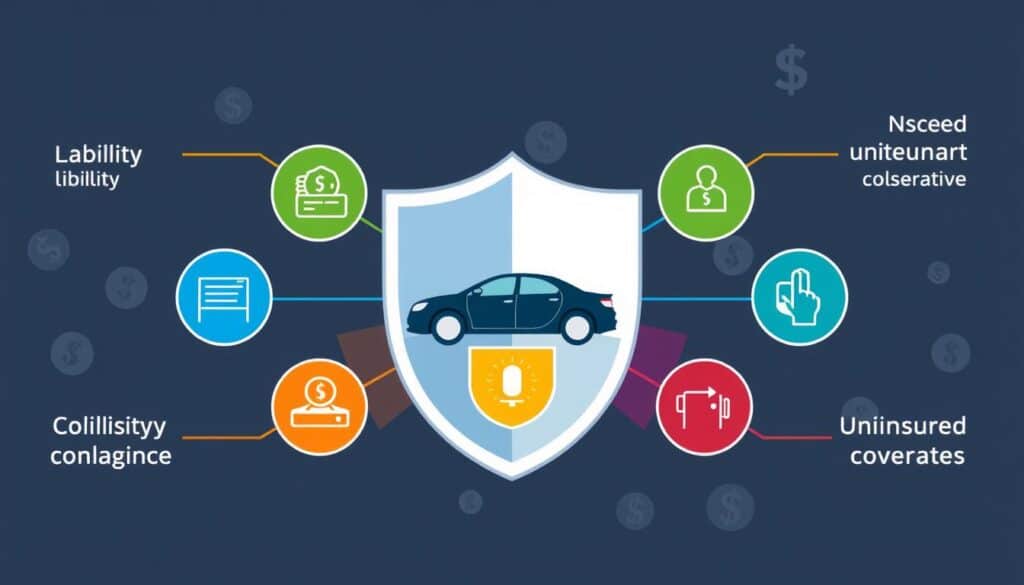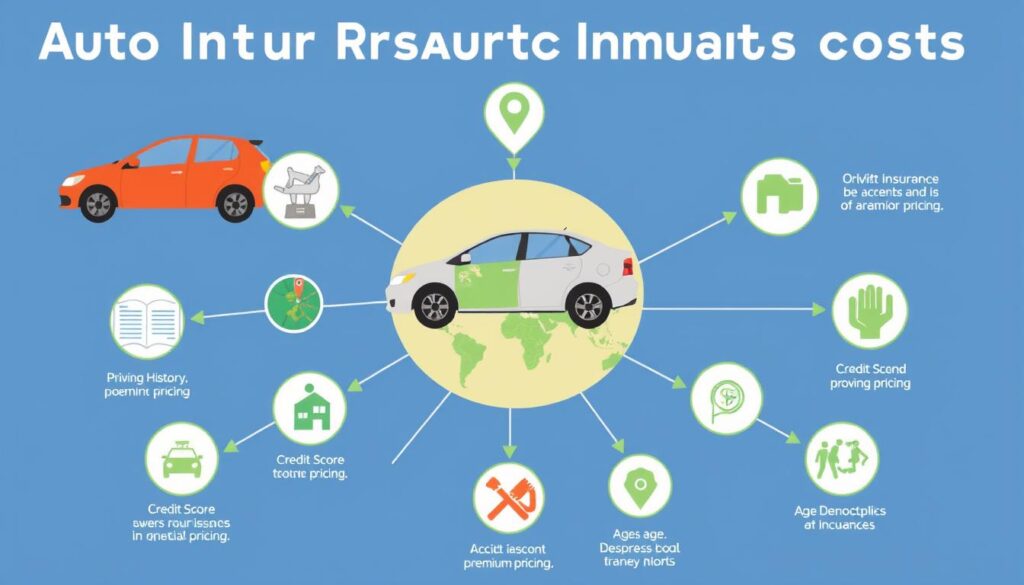Auto insurance is key for car owners in the U.S. It’s a deal between the owner and the insurance company. It covers risks like accidents, damage to property, and medical bills. Most places make you have some insurance to keep everyone safe on the road.
Insurance policies last six months or a year and can be renewed. They fit your needs and how much you can pay. With the right insurance, you can avoid huge financial hits from accidents or theft.
Key Takeaways
- Auto insurance protects you from financial loss due to accidents, damage, and medical costs.
- In most U.S. states, you must have basic insurance to cover injuries and property damage.
- You can customize your insurance to fit your needs and budget, with options like comprehensive and collision coverage.
- Things like your driving record, age, and how much coverage you choose can affect your insurance costs.
- Having the right insurance helps you avoid financial trouble from accidents, theft, and other car-related issues.
Understanding Auto Insurance Fundamentals
Auto insurance is key to protecting against financial loss. It covers many possible incidents. This includes bodily injury liability and property damage liability. These parts of a policy help protect drivers, passengers, and others in an accident.
What Auto Insurance Covers
Auto insurance policies have different types of coverage. Personal injury protection (PIP) pays for medical costs for the policyholder and their passengers. Uninsured motorist coverage helps if someone hits you and doesn’t have insurance.
State Requirements and Mandatory Coverage
Most states require a minimum of bodily injury liability and property damage liability coverage. This makes drivers responsible for damages they cause. Some states, like Pennsylvania and Maryland, also require extra coverage like PIP and uninsured/underinsured motorist protection.
Policy Terms and Renewal Process
Auto insurance policies last from six months to a year. You can renew them when they expire. During the policy term, you can change your coverage or deductibles. This lets you adjust your protection to fit your changing needs and budget.
| Coverage Type | Description |
|---|---|
| Bodily Injury Liability | Covers injuries to others caused by the policyholder’s negligence |
| Property Damage Liability | Covers damage to others’ property caused by the policyholder |
| Personal Injury Protection (PIP) | Covers medical expenses for the policyholder and their passengers |
| Uninsured/Underinsured Motorist | Protects the policyholder against accidents caused by drivers without adequate insurance |
“Auto insurance is a necessary financial safeguard for drivers, ensuring they are protected against the unexpected and can focus on the road ahead.”
Types of Coverage and Their Financial Benefits

There are many optional auto insurance coverages beyond what states require. These can offer great financial protection for drivers. Knowing what these coverages do can help you protect your assets better.
Collision Coverage: This coverage pays for damage to your vehicle in a collision, no matter who’s at fault. It’s very useful if you’re the one who caused the accident. It helps cover the costs of fixing or replacing your car.
Comprehensive Coverage: This insurance protects your vehicle from non-collision damage like theft, vandalism, fire, or weather damage. It gives you peace of mind and financial security against unexpected events.
Gap Insurance: If you lease or finance your vehicle, gap insurance is very helpful. It covers the gap between your car’s value and what you still owe if it’s totaled. This prevents you from having to pay off a loan on a car you no longer have.
Glass Coverage: This coverage protects your vehicle’s windshield, windows, and other glass parts. It covers repair or replacement costs without a deductible. It’s a convenient option for fixing common glass damages.
Understanding the different auto insurance coverages and their benefits helps you create a policy that meets your needs. This way, you get the protection you need.
Auto Insurance Premium Factors and Cost Management

Auto insurance premiums are influenced by many factors. Your gender, age, driving record, and vehicle type all play a part. Knowing these factors can help you manage your insurance costs better.
Factors Affecting Premium Rates
Gender and age are key factors in insurance rates. Men often pay more due to risky driving. Young drivers also face higher rates because they’re more likely to be in accidents. But, drivers over 55 usually get lower rates.
Your driving history is crucial. A clean record means lower costs. Your credit and vehicle type also affect your rates.
Deductibles and Their Impact on Costs
The deductible you choose greatly affects your costs. A higher deductible lowers your monthly payments. But, you’ll have to pay more if you make a claim. Find the right balance for your budget.
Ways to Lower Insurance Expenses
- Maintain a clean driving record by practicing safe driving habits and avoiding accidents or traffic violations.
- Take advantage of available discounts, such as those for safe driving, defensive driving courses, or bundling policies with the same insurer.
- Consider raising your deductible to lower your monthly premiums, but ensure you have the financial resources to cover the higher out-of-pocket costs if needed.
- Review and compare insurance policies regularly to ensure you’re getting the best coverage at the most competitive rates.
Understanding premium factors and using cost-saving strategies can help you manage your insurance costs. This way, you can protect your finances while driving.
How Auto Insurance Protects Your Assets

Auto insurance is key in protecting your personal assets from accident and legal claim costs. Without enough coverage, you could face big expenses for damages, medical bills, and legal fees. This could harm your financial security and even lead to bankruptcy.
Auto insurance mainly protects your assets through liability protection. Liability coverage pays for injuries or property damage caused by you or your vehicle. This way, you don’t have to use your savings or investments to cover these costs. Liability limits can be high, from $50,000/$100,000 to $250,000/$500,000, offering strong asset protection against legal claims.
Auto insurance also includes optional financial security features like collision, comprehensive, and medical payments coverage. These extra coverages help reduce the financial burden of accident-related expenses. They protect your assets from being used up.
| Coverage Type | Benefits |
|---|---|
| Bodily Injury Liability | Covers costs for injuries to others in an accident you cause, with higher limits offering greater liability protection |
| Property Damage Liability | Pays for damages to another vehicle or property in an accident you cause, with higher limits providing more asset protection |
| Collision Coverage | Covers the cost of repairing or replacing your vehicle if it is damaged in a collision, regardless of fault |
| Comprehensive Coverage | Protects against non-collision damages, such as theft, vandalism, or natural disasters, helping to maintain your financial security |
Choosing the right auto insurance coverage is crucial for protecting your personal assets and financial security. Regularly reviewing your policy and coverage limits is important. This ensures you have the right protection against unexpected risks and keeps your financial future secure.
Additional Coverage Options for Complete Protection

Standard auto insurance policies are essential, but savvy drivers look for more. They want extra protection to keep their finances safe. These options give peace of mind and fit individual needs.
Gap Insurance Benefits
Gap insurance helps drivers avoid big financial hits if their car is totaled. It covers the difference between the car’s value and what’s owed on it. This way, drivers don’t have to pay off a car they can’t drive.
Comprehensive Coverage Details
Comprehensive coverage is more than basic. It protects against theft, vandalism, and natural disasters. It’s a strong safety net that helps when unexpected things happen, saving money and keeping finances safe.
Special Coverage Considerations
- Rental car coverage lets policyholders use a replacement vehicle while theirs is fixed. It keeps them mobile and independent.
- Roadside assistance helps with flat tires, dead batteries, and breakdowns. It offers convenience and peace of mind on the road.
- Accident forgiveness prevents premium hikes after the first at-fault accident. It saves money and keeps rates low.
- New car replacement coverage lets drivers get a new car if theirs is totaled. It protects against depreciation in the first years.
These extra coverage options show the wide range of protection available. By choosing wisely, drivers can feel more secure and save money on the road.
Also Read : Understanding Different Insurance Types
Conclusion
Auto insurance is key to protecting your finances from driving risks. Knowing about coverage, policy terms, and what affects your premium helps you make smart choices. This ensures your vehicle and financial health are well-protected.
Regularly reviewing your policy is important as your life changes. It helps you stay covered and manage risks effectively.
Auto insurance is vital because accidents can happen to anyone. Policies last six months or a year, and you can change them anytime. This flexibility helps you adapt to your changing needs.
Whether it’s a car, truck, or motorcycle accident, or even a crash with a drunk driver, insurance covers many risks. It also includes accidents in construction zones, with public transit, bicycles, pedestrians, and more.
The auto insurance world is always changing, with rising costs and new rules. Keeping your finances safe is more important than ever. By looking at your coverage options, managing your deductibles, and finding ways to save, you can get good protection without breaking the bank.
In the end, a good auto insurance plan is like a shield for your finances. It protects you and your assets from the unknown dangers of driving.
FAQs
Q: What is the role of auto insurance in protecting against financial loss?
A: Auto insurance plays a crucial role in providing financial protection in the event of accidents, theft, or damage. It helps cover repair costs, medical expenses, and liability claims, minimizing the financial burden on the policyholder.
Q: How can I get a car insurance quote?
A: You can get a car insurance quote by visiting an insurance agency’s website or using their mobile app. Simply fill out the required information about your vehicle and driving history to receive an estimate of your insurance rates.
Q: What factors affect my car insurance coverage and rates?
A: Factors that affect car insurance coverage and rates include your driving history, the type of vehicle you drive, your location, and the amount of coverage you need. Rates may vary by state and may also depend on the insurance products you choose.
Q: What are some common auto insurance discounts I can apply for?
A: Many insurance companies offer discounts for safe driving, bundling policies, good student discounts, and low mileage. It’s worth asking your insurance agent about specific insurance discounts that could save you money.
Q: How do I compare car insurance to find the best option for me?
A: To compare car insurance, gather quotes from multiple providers, review the coverage options, and assess the premiums. You can use online tools to help you compare car insurance rates and find the best car insurance for your needs.
Q: What should I do if I need to file an insurance claim?
A: If you need to file an insurance claim, contact your insurance agency as soon as possible. Provide them with all the necessary details about the incident, including photos and police reports if applicable, to expedite the claims process.
Q: How can I customize my car insurance policy?
A: You can customize your car insurance policy by choosing the coverage options that fit your needs, such as adding liability coverage, collision, or comprehensive coverage. Discuss your options with an insurance agent to tailor your policy effectively.
Q: How can I see how much I could save on my auto insurance?
A: To see how much you could save on your auto insurance, start your quote by providing relevant information about your vehicle and driving history. Many insurers also offer a free auto insurance quote, which can help you determine potential savings.
Q: What is the average savings I can expect with auto insurance?
A: The average savings on auto insurance can vary significantly based on individual circumstances, but many policyholders report saving an average of 20-30% by comparing rates and taking advantage of available insurance discounts.
Source Links
- https://www.investopedia.com/terms/a/auto-insurance.asp
- https://content.naic.org/consumer/auto-insurance.htm
- https://www.iii.org/publications/insurance-handbook/insurance-basics/auto-insurance-basics